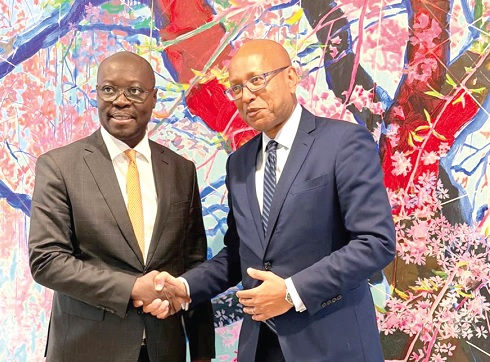The government is set to roll out a major agriculture-driven jobs initiative that can create more than 500,000 employment opportunities across the country as part of a new strategy to transform the sector and accelerate inclusive economic growth.
Consequently, a comprehensive oil palm plantation policy is being finalised to be captured in the 2026 Budget to support the initiative.
The Minister of Finance, Dr Cassiel Ato Forson, who disclosed this, said it was part of a broader push to develop high-value economic crops that can boost rural incomes, strengthen the country’s agro-processing value chain, and reduce dependence on imported raw materials.
The initiative also aims to position agriculture as a key driver of industrialisation by promoting large-scale cultivation of tree crops while encouraging private sector participation and sustainable farming practices.
The meetingDr Forson made the announcement during a high-level meeting with the International Finance Corporation’s (IFC) Regional Vice-President for Africa, Ethiopis Tafara, in Washington, DC, on Saturday, October 18, this year.
The talks focused on deepening collaboration between Ghana and the IFC to unlock new investments and support for the country’s agricultural transformation agenda.
Present at the meeting were the Presidential Advisor on the Economy and former Finance Minister, Seth Terkper, and members of the Ghanaian delegation who participated in the International Monetary Fund (IMF)-World Bank Annual Meetings in Washington, DC.
High-value economic cropsDr Forson explained that the policy was a central component of a broader national agenda to develop high-value economic crops and strengthen the country’s agro-industrial base.
He said the initiative was designed to fully harness the benefits of crops such as oil palm by promoting large-scale cultivation, processing and value addition.
The Finance Minister added that the move was expected to create thousands of direct and indirect jobs across the agricultural value chain — from farm-level production to manufacturing and export activities.
“The opportunities in economic crops are immense. With the right investment and strategic partnerships, Ghana can create over 500,000 jobs across the value chain,” he said.
Broader economic transformationDr Forson added that agriculture would serve as the cornerstone of Ghana’s broader economic transformation and industrialisation drive.
He said establishing large-scale plantations demanded substantial and long-term investment, which could not be achieved through short-term funding alone.
To this end, he said, the government was collaborating with the World Bank, the IFC and other development partners to mobilise sustainable financing to empower private sector participation and drive inclusive growth in the agricultural sector.
IFC’s strategic prioritiesFor his part, Mr Tafara stated that the initiative aligned with the IFC’s strategic priorities for supporting inclusive and sustainable growth across Africa.
He said the multilateral corporation was committed to deepening its partnership with Ghana in addressing key national development challenges, particularly in agriculture and job creation.
The Regional Vice-President for the IFC said that agriculture remained one of the most effective channels for unlocking Africa’s vast demographic potential and should translate into meaningful economic opportunities.
Mr Tafara added that by investing in agribusiness value chains, countries such as Ghana could foster resilience, boost exports and create long-term, sustainable employment for their growing youth populations.



